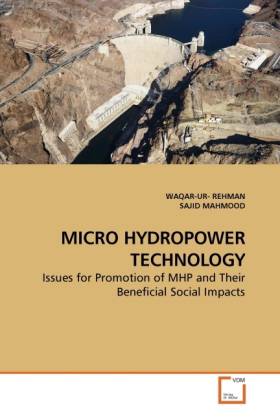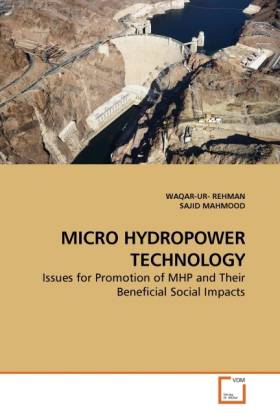
Bedankt voor het vertrouwen het afgelopen jaar! Om jou te bedanken bieden we GRATIS verzending (in België) aan op alles gedurende de hele maand januari.
- Afhalen na 1 uur in een winkel met voorraad
- In januari gratis thuislevering in België
- Ruim aanbod met 7 miljoen producten
Bedankt voor het vertrouwen het afgelopen jaar! Om jou te bedanken bieden we GRATIS verzending (in België) aan op alles gedurende de hele maand januari.
- Afhalen na 1 uur in een winkel met voorraad
- In januari gratis thuislevering in België
- Ruim aanbod met 7 miljoen producten
Zoeken
MICRO HYDROPOWER TECHNOLOGY
Issues for Promotion of MHP and Their Beneficial Social Impacts
Waqar-Ur Rehman, Sajid Mahmood
Paperback | Engels
€ 48,45
+ 96 punten
Omschrijving
Micro-hydropower projects/ systems are relatively small power sources that are appropriate in most cases for individual users or groups of users who are independent of the electricity supply through grid. Many micro hydropower systems do not operate "run of river," which means that neither a large dam nor water storage reservoir is built nor is land flooded. Only a fraction of the available stream flow at a given time is used to generate power. Introduction and promotion of community based Micro Hydropower Systems is a very difficult job in developing country because the investors may face the social, political, technical and environmental risks in the absence of proper government supports. Results of the study highlight the problems / barriers in introducing and promotion of MHP and finally conclusion and recommendations are drawn for researchers and planners. The author appreciate the efforts of Barthlemy Chaton and his team in facilitating and highly acknowledge publishing of it by VDM Publishing House Ltd., for technical knowledge sharing internationally.
Specificaties
Betrokkenen
- Auteur(s):
- Uitgeverij:
Inhoud
- Aantal bladzijden:
- 84
- Taal:
- Engels
Eigenschappen
- Productcode (EAN):
- 9783639231274
- Uitvoering:
- Paperback

Alleen bij Standaard Boekhandel
+ 96 punten op je klantenkaart van Standaard Boekhandel
Beoordelingen
We publiceren alleen reviews die voldoen aan de voorwaarden voor reviews. Bekijk onze voorwaarden voor reviews.









